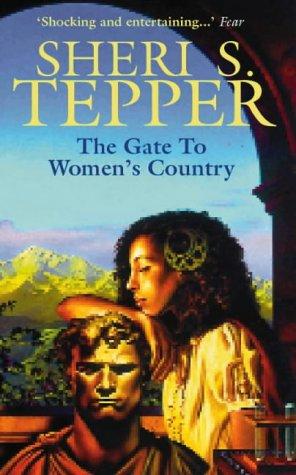Thom reviewed The Gate to Women's Country by Sheri S. Tepper
Review of "The Gate to Women's Country" on 'Goodreads'
3 stars
Sheri S. Tepper's The Gate to Women's Country is one of 21 works added to the SF Masterworks list this year. Of all the works on the list, this may be the one with the strongest and most well written female character, but I found the story itself irritating.
This novel is set in the future, after a great war has created areas of "devastation" and most of the population is wiped out. The population (of this area at least) is divided, with women living in the city and the men live in a garrison outside the walls to protect them. At first glance, a feminist fantasy. Except the women have some men living with them, and these men are actually superior specimens, and... well, the fantasy just breaks down.
The society portrayed is matriarchal. The protagonist Stavia is a strong female character, intelligent and sensitive. Over the course of the novel she learns and grows through adversity. Her mother is on the ruling council and possesses a lot of secret knowledge about her society, revealed towards the end of the book.
Each few chapters had a wrapping metaphor of a play that the older Stavia was studying, then rehearsing, and finally presenting. Towards the end of the novel, this all made sense, but in the middle I found it an interruption. Both the play and the story of young Stavia moved very slowly at the beginning of the book, establishing the character and the scene more completely than necessary.
The novel picks up towards the middle as Stavia returns from medical training in a nearby town. She is then tasked with taking a trip to the south, which does more to reinforce just how bad things used to be (and by comparison, how much better things are in Women's Country). There she finds the inbred Holylanders who treat women as chattel (or cattle) and are generally bad – shades of Mormon Fundamentalism. The later portions of the play (the story within the story) also demonstrate a Greek society where women are treated badly, as observed by ghosts who can no longer be abused. Neither of these counter examples are particularly subtle.
Many of Sheri S. Tepper's science fiction works fit into the category of ecofeminism – the idea that men are responsible for oppressing both women and the environment. Without spoiling some of the novel's secrets, I found the morals of the women particularly gray, and not just because of my gender. I also disagree with the assertion that violence is a male trait, one that can be bred out. The same is said of Homosexuality here, netting this book the undesirable description of "Chillingly Homophobic".
I am glad I read this story, and will definitely track down Grass in the near future. Strong writing and a solid female lead are stuck in a slow and somewhat distasteful story. The description on Goodreads calls this her finest novel – I hope that isn't true – I rate it 3½ stars.

